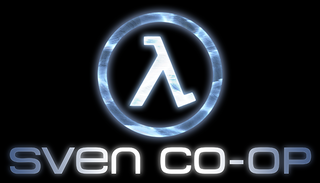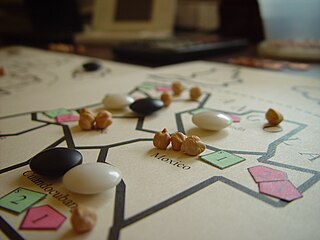Game theory is the study of mathematical models of strategic interaction among rational decision-makers. It has applications in all fields of social science, as well as in logic, systems science and computer science. Originally, it addressed zero-sum games, in which each participant's gains or losses are exactly balanced by those of the other participants. In the 21st century, game theory applies to a wide range of behavioral relations, and is now an umbrella term for the science of logical decision making in humans, animals, and computers.
The prisoner's dilemma is a standard example of a game analyzed in game theory that shows why two completely rational individuals might not cooperate, even if it appears that it is in their best interests to do so. It was originally framed by Merrill Flood and Melvin Dresher while working at RAND in 1950. Albert W. Tucker formalized the game with prison sentence rewards and named it "prisoner's dilemma", presenting it as follows:
Two members of a criminal gang are arrested and imprisoned. Each prisoner is in solitary confinement with no means of communicating with the other. The prosecutors lack sufficient evidence to convict the pair on the principal charge, but they have enough to convict both on a lesser charge. Simultaneously, the prosecutors offer each prisoner a bargain. Each prisoner is given the opportunity either to betray the other by testifying that the other committed the crime, or to cooperate with the other by remaining silent. The possible outcomes are:
Tom Clancy's Splinter Cell is a series of stealth shooter games, the first of which was released in 2002, and their tie-in novels. The protagonist, Sam Fisher, is a highly trained agent of a fictional black-ops sub-division within the NSA, dubbed "Third Echelon". The player controls Fisher to overcome his adversaries in levels. All the console and PC games in the series were positively received, and the series is commercially successful. The series was once considered to be one of Ubisoft's flagship franchises, selling more than 31 million copies as of 2011, although as of 2021 there has not been a new installment since 2013.
A multiplayer video game is a video game in which more than one person can play in the same game environment at the same time, either locally or online over the internet. Multiplayer games usually require players to share the resources of a single game system or use networking technology to play together over a greater distance; players may compete against one or more human contestants, work cooperatively with a human partner to achieve a common goal, or supervise other players' activity. Multiplayer games allow players interaction with other individuals in partnership, competition, or rivalry, providing them with social communication absent from single-player games.
Gameplay is the specific way in which players interact with a game, and in particular with video games. Gameplay is the pattern defined through the game rules, connection between player and the game, challenges and overcoming them, plot and player's connection with it. Video game gameplay is distinct from graphics and audio elements.

Cooperation is the process of groups of organisms working or acting together for common, mutual, or some underlying benefit, as opposed to working in competition for selfish benefit. Many animal and plant species cooperate both with other members of their own species and with members of other species.
In game theory, a cooperative game is a game with competition between groups of players ("coalitions") due to the possibility of external enforcement of cooperative behavior. Those are opposed to non-cooperative games in which there is either no possibility to forge alliances or all agreements need to be self-enforcing.

Half-Life: Decay is a multiplayer-only expansion pack for Valve's first-person shooter Half-Life. Developed by Gearbox Software and published by Sierra On-Line, Decay was released as part of the PlayStation 2 version of Half-Life in 2001. It is the third expansion pack for Half-Life, and like its predecessors, Decay returns to the setting and timeline of the original story, albeit portraying the story from the viewpoint of a different set of protagonists: two female scientists working in the Black Mesa Research Facility. Decay is a cooperative multiplayer game, designed to be played by two people working together to pass through the game's levels.
In game theory, a non-cooperative game is a game with competition between individual players, as opposed to cooperative games, and in which alliances can only operate if self-enforcing.
Game theory is the branch of mathematics in which games are studied: that is, models describing human behaviour. This is a glossary of some terms of the subject.
Cooperative video game is a video game that allows players to work together as teammates, usually against one or more non-player character opponents. This feature is often abbreviated as co-op.
In cooperative game theory, the core is the set of feasible allocations that cannot be improved upon by a subset of the economy's agents. A coalition is said to improve upon or block a feasible allocation if the members of that coalition are better off under another feasible allocation that is identical to the first except that every member of the coalition has a different consumption bundle that is part of an aggregate consumption bundle that can be constructed from publicly available technology and the initial endowments of each consumer in the coalition.

Cooperative board games are board games in which players work together to achieve a common goal, the result being either winning or losing as a group. As the name suggests, cooperative games stress cooperation over competition. This type of board game attracts people who enjoy the social aspect of games and is a good way to get new board game players interested in the hobby. Either the players win the game by reaching a pre-determined objective, or all players lose the game, often by not reaching the objective before a certain event ends the game.

Lord of the Rings is a board game based on the high fantasy novel The Lord of the Rings by J. R. R. Tolkien. Published in 2000 by Kosmos in Germany, Wizards of the Coast in the U.S., and Parker Brothers in the U.K., the game is designed by Reiner Knizia and features artwork by illustrator John Howe. It won a Spiel des Jahres special award for best use of literature in a game and in 2004 it won the Games Magazine Games 100 Honor in the Family Strategy category. A slightly revised version was later published by Fantasy Flight Games.
The following outline is provided as an overview of and topical guide to games and gaming:

Sven Co-op is a co-op variation of the 1998 first-person shooter Half-Life. The game, initially released as a mod in January 1999, and created by Daniel "Sven Viking" Fearon, enables players to play together on online servers to complete levels, many which are based on the Half-Life universe but include other genres. In addition to the cooperative gameplay, Sven Co-op includes improvements from the original Half-Life, including improved artificial intelligence for both enemy and allied non-player characters.
Ninja Theory Limited is a first-party British video game development studio based in Cambridge, England. Notable games it has developed include Kung Fu Chaos, Heavenly Sword, Enslaved: Odyssey to the West, DmC: Devil May Cry and Hellblade: Senua's Sacrifice.

A game is a structured form of play, usually undertaken for entertainment or fun, and sometimes used as an educational tool. Games are distinct from work, which is usually carried out for remuneration, and from art, which is more often an expression of aesthetic or ideological elements. However, the distinction is not clear-cut, and many games are also considered to be work or art.

Game design is the art of applying design and aesthetics to create a game for entertainment or for educational, exercise, or experimental purposes. Increasingly, elements and principles of game design are also applied to other interactions, in the form of gamification. Game designer and developer Robert Zubek defines game design by breaking it down to its elements, which he says are the following:

Scythe is a board game for 1 to 5 players designed by Jamey Stegmaier and published by Stonemaier Games in 2016. Set in an alternate history 1920s Europe, in Scythe players control factions which produce resources, build economic infrastructure, and use giant dieselpunk war machines called mechs to fight and control territory. Players take up to two actions per turn using unique player boards, with the game proceeding until one player has achieved six achievements, at which point the players receive coins for their achievements and territories controlled, with the player with the most coins winning.







